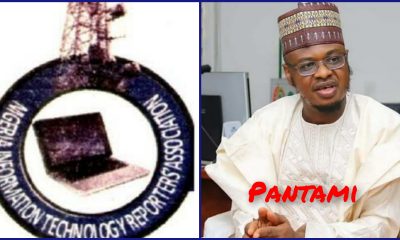Action
CBN Sacks Boards of First Bank, FBN Holdings, Appoints Replacements
Published
3 years agoon
The Central Bank of Nigeria has sacked the board of directors of First Bank of Nigeria Limited and FBN Holdings Plc and has appointed a new set of directors for the two companies with immediate effect.
CBN had this afternoon queried the Board of the bank for removing Adesola Adeduntan as the Managing Director/Chief Executive Officer, and appointing Gbenga Shobo as MD/CEO designate without regulatory approval.
The CBN had also faulted the appointment of Abdullahi Ibrahim as deputy managing director, as well as the appointment of Ini Ebong, Segun Alebiosu, Seyi Oyefeso and Bashirat Odunewu, as executive directors.
Addressing the media, CBN Governor, Godwin Emefiele, announced the sacking of all members of the board of the bank for the supposed affront. Emefiele also reinstated Adeduntan as the MD/CEO of the bank.
- Emefiele announced the appointment of Tunde Hassan-Odukale as Chairman of First Bank Limited while Remi Babalola will serve as Chairman of FBN Holdings.
The text of his media briefing are reproduced below:
“The media has been awash with commentaries on the purported management changes at First Bank of Nigeria Ltd (FBN) and the related regulatory inquiry by the Central Bank of Nigeria (CBN) to the Board of First Bank of Nigeria Limited. It has therefore become necessary for me to address the public to clear any misconceptions.
“Ordinarily the board is vested with the authority to make changes in the management team subject to CBN approval. However, the CBN considers itself a key stakeholder in management changes involving FBN due to the forbearances and close monitoring by the Bank over the last 5 years aimed at stemming the slide in the going concern status of the bank. It was therefore surprising for the CBN to learn through media reports that the board of directors of FBN, a systemically important bank under regulatory forbearance regime had effected sweeping changes in executive management without engagement and/or prior notice to the regulatory authorities. The action by the board of FBN sends a negative signal to the market on the stability of leadership on the board and management and it is in light of the foregoing that the CBN queried the board of directors on the unfortunate developments at the bank.
“As you may be aware, FBN is one of the systemically important banks in the Nigerian banking sector given its historical significance, balance sheet size, large customer base and high level of interconnectedness with other financial service providers, amongst others. By our last assessment, FBN has over 31m customers, with deposit base of N4.2trn, shareholders funds of N618bn and NIBSS instant payment (NIP) processing capacity of 22% of the industry. To us at the CBN, not only is it imperative to protect the minority shareholders, that have no voice to air their views, also important, is the protection of the over 31m customers of the bank who see FBN as a safe haven for their hard-earned savings.
“The bank maintained healthy operations up until 2016 financial year when the CBN’s target examination revealed that the bank was in grave financial condition with its capital adequacy ratio (CAR) and non-performing loans ratio (NPL) substantially breaching acceptable prudential standards.
“The problems at the bank were attributed to bad credit decisions, significant and non-performing insider loans and poor corporate governance practices. The shareholders of the bank and FBN Holding Plc also lacked the capacity to recapitalize the bank to minimum requirements. This conclusions arose from various entreaties by the CBN to them to recapitalize.
“The CBN stepped in to stabilize the bank in its quest to maintain financial stability, especially given FBN’s systemic importance as enumerated earlier. Regulatory action taken by the CBN in this regard included:
- Change of management team under the CBN’s supervision with the appointment of a new Managing Director/ Chief Executive Office in January 2016.
- Grant of the regulatory forbearances to enable the bank work out its non-performing loans through provision for write off of at least N150b from its earning for four consecutive years.
- Grant of concession to insider borrower to restructure their non-performing credit facilities under very stringent conditions
- Renewal of the forbearances on a yearly basis between 2016 and 2020 following thorough monitoring of progress towards exiting from the forbearance measures
“The measures had yielded the expected results as the financial condition of FBN improved progressively between 2016 when the forbearance was initially granted to the current financial year. For instance, profitability, liquidity and CAR improved whilst NPL reduced significantly.
“Notwithstanding the significant improvement in the bank’s financial condition with positive trajectory of financial soundness indicators, the insider related facilities remained problematic.
“The insiders who took loans in the bank, with controlling influence on the board of directors, failed to adhere to the terms for the restructuring of their credit facilities which contributed to the poor financial state of the bank. The CBN’s recent target examination as at December 31, 2020 revealed that insider loans were materially non-compliant with restructure terms (e.g. non perfection of lien on shares/collateral arrangements) for over 3 years despite several regulatory reminders. The bank has not also divested its non-permissible holdings in non-financial entities in line with regulatory directives
“Following further review of the situation and in order to preserve stability of the bank, so as to protect minority shareholders and depositors, the Management of the CBN in line with its powers under BOFIA 2020 has approved and hereby directs:
- Immediate removal of the all directors of FBN Ltd and FBN Holdings Plc
- The appointment of the following persons as directors in FBN Ltd and FBN Holdings Plc
Holdco
- Chairman – Remi Babalola
- Dr. Fatade Abiodun Oluwole
- Kofo Dosekun
- Remi Lasaki
- Dr Alimi Abdulrasaq
- Ahmed Modibbo
- Khalifa Imam
- Sir Peter Aliogo
- UK Eke – Managing Director
Bank
- Chairman – Tunde Hassan-Odukale
- Tokunbo Martins
- Uche Nwokedi
- Adekunle Sonola
- Isioma Ogodazi
- Ebenezer Olufowose
- Ishaya Elijah B. Dodo
- Sola Adeduntan – Managing Director
- Gbenga Shobo – Deputy Managing Director
- Remi Oni – Executive Director
- Abdullahi Ibrahim – Executive Director
“The CBN hereby reassures the depositors, creditors and other stakeholders of the bank of its commitment to ensure the stability of the financial system. There is therefore no cause for panic amongst the banking public, given that the actions being taken are meant to strengthen the bank and position it as a banking industry giant.,” Emefiele ended his speech.
You may like
-


QNET Creates Initiative To Increase Financial Inclusion In Youth Communities
-


Dr Mike Adenuga @70: How A Quiet Philanthropist Emerged Game Changer In Nigeria’s Telecom Sector
-


Naira Redesign: Expert Urges CBN to Use Technology to Reduce Pains On Nigerians- Expert
-


Pantami, Danbatta, Telecom Stakeholders To Brainstorm at NITRA’s ICT Growth Forum 
Peter Oluka (@peterolukai), the Editor of TechEconomy has joined the Nigeria Internet Registration Association (NiRA) Executive Board of Directors (EBoD).
Peter, a multi-award winner practicing ICT Journalist was elected at the 15th Annual General Meeting (AGM) cum election held in Lagos on Friday at The Zone, Lagos where Mr. Adesola Akinsanya and Mr. Murtala Abdullahi emerged the new President and the Vice President respectively.
They took over from Mr. Mohammed Rudman and Mr. Toba Obaniyi in that order. Other members elected into NIRA Executive Board of Directors (EBoD) at the meeting are; Mr. Ebenezer Dare of Hostlag Limited, and Seun Kehinde of QServers Networks Limited.
Meanwhile, five members have been elected to the Board of Trustees of NiRA. They are; Mrs Ibukun Odusote; Publisher of ITRealms, Mr. Remmy Nweke; former Financial Secretary of NiRA, Mr. Biyi Oladipo; former NIRA president, Mrs. Mary Uduma and Executive Director Centre for Information Technology and Development (CITAD) Mr. Yunusa Zakari Ya’u.
Peter Oluka has been a .ng Domain Name Brand Ambassador since 2015). He actually started his mainstream journalism in 2010 working with the Nigerian NewsDirect Newspaper. His penchant for newsworthy events and stunts registered NewsDirect’s presence in the league of Property & Environment and Labour pious media outfits.
He also Co-founded GrassRoots.ng, a news platform rooted in Speaking for the Global Citizen. He also Co-founded Njalo.ng; an online marketplace for ‘Easy sell & Easy Buy’ or new and used products.
The Executive Vice Chairman of the Nigerian Communications Commission, Professor Umar Danbatta disclosed this while delivering the Keynote Address at the dinner hosted by the Board of Trustees of the Nigeria Media Merit Award, NMMA, to flag-off the commemoration of the 30th Anniversary of NMMA as Africa’s foremost media excellence recognition institution, at the Lagos Sheraton Hotel on Tuesday night.
“This represents a teledensity of 109.47%. Besides, basic Internet subscriptions have also grown from zero in the pre-liberalisation era to over 152 million. It is also gratifying that the broadband subscriptions now stand at 85 million, representing a 44.49% penetration,” Danbatta said.
Dwelling on the topic, “The NCC New Strategic Vision (Implementation) Plan (SVP) 2021-2025: A Transformation Agenda”,which signposts thedirection of the Nigerian telecom industry in the next five years,Danbatta recalled the trajectory of the evolution of telecoms in Nigeria.
Represented by the Director, Public Affairs of the NCC, Mr. Reuben Muoka, the CEO of NCC, he recalled the nation’s showing of a paltry 18,724 telephone lines at independence in 1960 to serve a population of 40 million people, translating to a teledensity of 0.5 at that time.
Today, “the Information and Communication Technology (ICT) sector contributed 18.44 per cent to the nation’s Gross Domestic Product (GDP) in the second quarter of 2022. From this figure, telecommunications sector alone contributed 15 per cent,” Danbatta said to place on record the unprecedented contribution of the telecom and ICT industry to GDP.
Action
N200 Billion ICT Bank and other Strategies to Rescue the Nigerian Telecom Sector 
Published
2 years agoon
August 20, 2022By Elvis Eromosele
The Nigerian telecommunications sector must have nine lives. No, it is not a cat. It is however almost always in a near constant mortal struggle with the forces that be – read, government and its agents. The fact that it’s still here means that it has somehow managed to survive, remained sustainable and even dared to thrive. It is a phenomenon that ought to be studied.
Every indicator shows that the telecom sector remains the bright spot in the nation’s weak economy. It drives socio-economic development, boosts productivity and contributes to improving the lives of citizens like no other sector.
The COVID-19 pandemic impacted negatively on the global economy by precipitating lockdown and economic disruptions with transport, tourism and aviation sectors tumbling. The telecom sector however continued to “buga”. It saw an increase in voice service and massive growth of digital channels for daily routine activities ranging from telecommuting to entertainment and social engagements. The sector witnessed the growth and saw huge profits as financial reports from major operators show.
The Nigeria Telecom sector is a gift that keeps on giving. It has witnessed strong growth in recent years and is expected to have continued growth over the foreseeable future. The growth in the sector, according to industry watchers, has been driven by the increasing population, growing demand for communication services, and rising adoption of smartphone services. Some experts have pointed to strong support by the regulatory authorities which in recent times has led to the licensing of the 5G network in the country – a feat some have called the first in Africa.
Investors in telecom operations are smiling at the bank. It is not surprising therefore that everyone wants a piece of the action, even the government.
It must be stated that the government collects the value-added tax, annual operating levies, licensing fees and duties among others. This is in addition to all the other statutory taxes including PAYE and withholding tax.
Now, there are reports that the Finance Minister, Zainab Shamsuna Ahmed, is actively pushing for another tax, a five per cent excise duty on telecoms services. Most right-thinking Nigerians, including, interestingly, the Minister of Communications and Digital Economy, Prof Isa Ali Ibrahim Pantami, have kicked against it. If a recent news report is to be believed, the finance minister is not backing down.
If the government is keen on milking the telecom sector, it should at least step up on its behalf and help tackle some of the long-standing issues that have held the sector back.
The challenges are not new. Many of them have plagued the sector since the liberalization of the industry. Industry experts are quick to point out the fact that these challenges are also opportunities when viewed through the right lenses.
Here are seven of the most pressing challenges, with what I hope are feasible solutions. The government should give it a look-in if doesn’t want to kill the goose that lays the golden egg.
Difficulty in accessing long-term funds for the industry – The government must hasten to establish an ICT Bank. While it should be in the mould of the Agricultural Bank, it should operate like a venture capital entity. So, after due diligence, the ICT Bank will invest in tech starting with a clearly stated exit /pull-out date. I propose an initial take-off grant of N200 billion naira only.
Right of way – The goal of the right of way policies should not be revenue generation but to facilitate the speedy deployment of telecom infrastructure. In the short term, states can take a leaf from Ekiti State which reduced telecom’s right of way charges by 97 per cent. For the long term, states should install road ducts on a build-and-lease basis. The federal government can set an example here by installing ducts on all new federal roads and leasing to operators based on an agreed realistic billing scheduled for usage.
Multiple taxations – Again, governments at all levels, need to stop seeing telcos as only cash cows. Efforts must be towards proper harmonization of taxes and levies and so make it uniform across every state and locality. This will undoubtedly aid the planning and deployment of services by operators.
Energy challenge – Yes, the telcos knew that Nigeria had a power problem when they paid for licenses in 2001. But who could have imagined that the issue will persist unresolved, for this long? Currently, the logistics of ensuring round-the-clock availability of power is a nightmare that keeps whole teams awake many a night. A straightforward solution is the establishment of energy parks to serve critical infrastructure. QED!
Local content – Some progress has been made here, especially through the National Office for Technology Acquisition and Promotion (NOTAP). To move forward the government and other corporations need to host local content locally. As a corollary, Nigeria must urgently adopt the doctrine of data sovereignty.
Multiple regulations – This is another problem that is almost as old as the industry itself. The NCC has done a lot of work here. Nigeria must explore a converged regulatory regime as the way out.
Capacity building – Human resources have always been an issue but the recent increase if the rate of migration has made it a mini-crisis. The Nigerian Universities Commission (NUC) and the NCC have their work cut out for them – bridge the gap between academia and industry via curriculum reform involving the industry and internships.
I’ll be the first to admit that these problems and solutions are not exhaustive. The NCC may want to consider calling a stakeholder forum to deliberate on the problems and proffer solutions. The white paper produced can now be the basis of engagement with the government and its relevant agencies.
For the government, the focus should not be only on sharing the existing telecom cake, but also on helping the industry bake a bigger cake.
Elvis Eromosele, a Corporate Communication professional and public affairs analyst lives in Lagos.